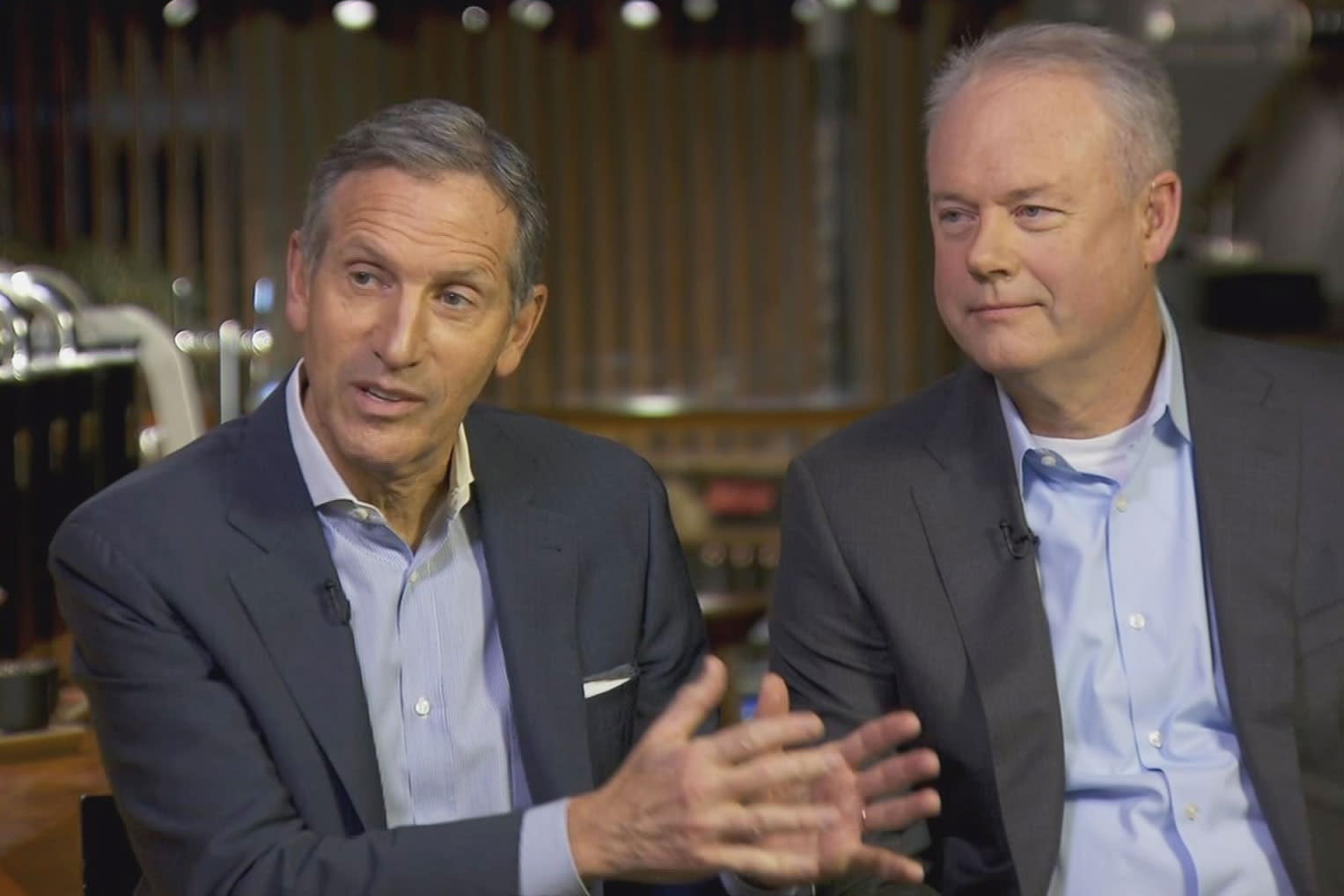
Starbucks CEO Kevin Johnson is retiring after five years on the job.
Howard Schultz will return as interim CEO, once again taking the helm of the company he elevated into a global brand while the company searches for a long term successor. This will be his third tenure as the coffee giant’s chief executive.
Shares of the company rose 6% in premarket trading on the news. The company announced the leadership transition ahead of its annual shareholder meeting on Wednesday.
“A year ago, I signaled to the Board that as the global pandemic neared an end, I would be considering retirement from Starbucks. I feel this is a natural bookend to my 13 years with the company,” Johnson said in a statement.
Johnson joined the board in 2009 while working as CEO of Juniper Networks, and became a member of the leadership team in 2015 as president and COO. In 2017, Johnson was named President and CEO, succeeding Schultz. Wednesday’s annual shareholder meeting marks his 14th with the company, he wrote in his final letter to employees.
In addition to steering the company through the pandemic, Johnson used his expertise as a former tech executive throughout his tenure to push Starbucks into the digital age, revamping its loyalty program and updating its store footprint to reflect the different ways consumers want to buy their coffee. He also accelerated the chain’s expansion in China, now its second-largest market.
In his time as head of the company, shares of Starbucks rose more than 50%, including Wednesday’s premarket gains.
Chair of Starbucks’ board Mellody Hobson told CNBC’s “Squawk Box” the company intends to select a permanent successor by the fall.
“We’re not going to hire over Zoom, I can tell you that,” Hobson, co-CEO of Ariel Investments, said on CNBC’s “Squawk Box.”
She added the company already has a number of strong candidates in contention for the top job.
Schultz, 68, said in a statement he previously had no plans to return to the company. He served as CEO from 1986 to 2000, and again from 2008 to 2017. He also weighed a potential run for president ahead of the 2020 elections.
“When you love something, you have a deep sense of responsibility to help when called. Although I did not plan to return to Starbucks, I know the company must transform once again to meet a new and exciting future where all of our stakeholders mutually flourish,” Schultz said in a statement. “With the backdrop of COVID recovery and global unrest, its critical we set the table for a courageous reimagining and reinvention of the future Starbucks experience for our partners and customers.”
Schultz’s salary as interim chief executive will be $1, the company said. Hobson said the company will lean on “his excellent and his brilliance” throughout the transition, but denied he would stay on longer as the company’s next full-time chief executive.
“We have a great slate of candidates. People want this job, and we’re fully confident we’ll have a new leader in the fall,” she said. “He’s not going to stay for three years. … We get him until the fall, full stop. Trust me.”
The CEO shift falls against a backdrop of growing efforts among Starbucks employees to unionize. To date, roughly 140 Starbucks stores in 26 states have petitioned the National Labor Relations Board to unionize, according to organizers Starbucks Workers United. Six locations so far have voted in favor of a union.
In a move that may have signaled his return to the company, Schultz appeared at Buffalo, New York-area cafes ahead of union elections, along with other top Starbucks executives, to dissuade baristas from voting in favor of unionizing.
This week, the National Labor Relations Board filed a complaint over accusations Starbucks retaliated against two employees in Phoenix who were seeking to unionize their store location. On Tuesday, a group of 75 investors in Starbucks sent a letter to Hobson and Johnson urging the company to adopt a policy of neutrality for all current and future attempts of its workers to organize.
Hobson said Tuesday that Starbucks “made some mistakes” when asked about the union push.
“When you think about, again, why we’re leaning on Howard in this moment, it’s that connection with our people where we think he’s singularly capable of engaging with our people in a way that will make a difference,” she said.
Johnson’s retirement announcement marks the fourth notable CEO transition from a publicly traded restaurant company in recent months.
Domino’s Pizza CEO Ritch Allison will retire at the end of April, and Darden Restaurants’ Gene Lee will do the same the following month. Wingstop announced Monday that CEO Charlie Morrison stepped down to become chief executive of Salad and Go, a much smaller drive-thru salad chain.




